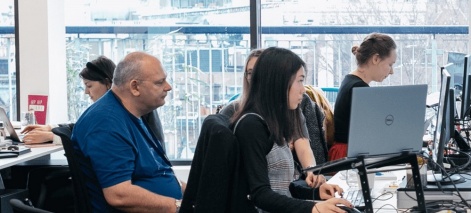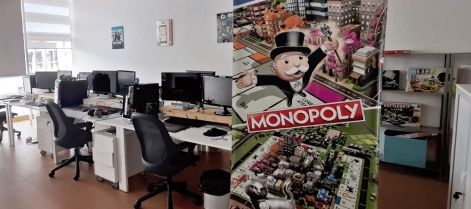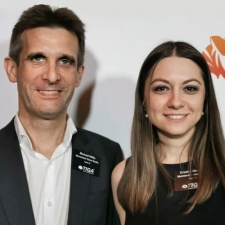The games industry plays host to a colourful cast of diverse individuals, from artists and coders to narrative designers and studio heads.
The skills to pull off these roles, however, are complex and differing, with each position requiring mastery in its field – especially in these complex times we are all living through at the minute.
To highlight some of the brilliant work that goes on behind the scenes as well as how employees around the world are adapting to the life of remote work, PocketGamer.biz is reaching out to the individuals who make up the games industry in our Jobs in Games: Remote Working series.
This week we spoke with Marmalade Game Studios CEO Mike Willis and COO Cristina Mereuta.
PocketGamer.biz: Can you tell us about your current role and what it entails?
Mike Willis: As CEO and COO, we run Marmalade Game Studio together. We are responsible for the company vision, business strategy, growth, and operations. In simple terms, every year we commit to revenue and profit figures to our board of directors and our job is to decide what the company will focus on in order to deliver those numbers at the end of the year.
I have a degree in Computer Science and a Masters in Project Management and I can't say I've used either really in my day-to-dayCristina Meruta
We then set the vision for the games we will make and once we set a roadmap, we ensure that day-to-day progress is being made in the right direction and people are happy working with us. If things change, it's our responsibility to react, adapt, and get everyone back on the right track.
How did you first get into games and how did you progress into this role?
Mike Willis: After a slightly complicated journey through university, I got a job at Bullfrog as a programmer. I spent two and a half years making my first game, Populous: The Beginning. I got to do so many cool things and loved the project and the combination of different things I was able to get involved with - probably a template for what I have gone on to do.
As Bullfrog became EA UK, I worked on Quake 3: Revolution, Shox, and several Harry Potter games. Over the next eight years, I was promoted to lead programmer and then technical director. I finished my EA career at Playfish working on The Sims Social.
Cristina Mereuta: My journey starts in Romania, where I was born and brought up. After university, I earned a job with a big local online publisher, first in UX, then as a project manager. My remit was to improve and optimise their websites from a UX point of view.
Slowly these improvements became less UX and more strategy, culminating with my idea to build a web-based game for a large-scale marketing campaign involving two global brands. This game ended up being extremely successful, popularising our website straight at the top of most visited websites in the country.

It made me realise that I was in the wrong industry, which lead me to EA as a producer on the FIFA franchise. I think the years I spent there really exposed me to both the good and the bad aspects of triple-A development and taught me almost everything I know about being responsible for a game. In 2014, I moved to the UK and got hired as a producer in Marmalade. Within a year I was running the studio with Mike, and the rest is history.
What did you study (if anything) to get your role? What courses would you advise for aspiring professionals in the area?
Cristina Mereuta: This is a funny one because I have a degree in Computer Science and a Masters in Project Management and I can't say I've used either really in my day-to-day. I've never worked as a programmer and the last code I wrote was for my dissertation.
With regard to project management, I found that the theory from school was sensible and made a lot of sense, but ultimately this is the sort of role (producer/project manager) that you learn on the job while being exposed to various situations that school can't really prepare you for. The confidence that you can handle things only really comes from experience.
Last year, we wouldn't have even tried to have a long strategy debate over the phone or via a videoconferenceMike Willis
Mike Willis: I taught myself programming but never seemed to get on with computer science. This ultimately led to an Aerospace Engineering degree which I finished despite realising halfway through that I really wanted to be a programmer still. I did a postgraduate course in computer graphics, which along with a load of cool little things I wrote on my own, were enough to get me the job at Bullfrog.
Do you think there are any misconceptions, public or professional, surrounding your area of expertise?
Cristina Mereuta: Some of our friends from other industries imagine we play games all day, though I assume this is the case for everyone working for a games developer/publisher. Our industry is growing rapidly and there are more people who can talk about what it means to be a games designer or artist, etcetera, yet there is still a bit of an aura of mystery surrounding all of us - as if making games is magic.
Mike Willis: I think beyond the general games misconceptions, we also see some misconceptions with the running of a company, regardless of the industry. Many people don't know what it entails and don't understand that the responsibility for operations across a company is more than reviewing what people work on.
Sometimes people don't understand why exactly we're busy and what else we have to do. We get involved with everything. We know just about what everyone is doing. When it's your company and your responsibility, you care about every little detail by ensuring everything is done, following the best processes, that the quality is as high as possible, and you learn every lesson along the way so you can do it even better next time. It's hard work spinning so many plates, but it's all worth it when it comes together.
What advice do you have for someone looking for a job in this profession?
Cristina Mereuta: In order to make good games, you need to play as many games as possible so you can understand what it's like for users when they encounter various things and use that to tweak how the game you work on will be experienced by its audience.
If you're looking for a job in the industry you need to show that you understand this, so figure out a way to convey it either through a portfolio, previous experience, or anything you can think of really.
How has the shift from office to remote working impacted your role, if at all?
Mike Willis: I wouldn't say it impacted the role itself. We are managing to function very well and be very effective (even remotely), but we definitely had to adapt in order to maintain the same level of communication with each other and with our teams.
Last year, we wouldn't have even tried to have a long strategy debate over the phone or via a videoconference. If one of us had to work from home that particular day, we would have just postponed the debate for when we were both in the office, and used the day to do more solitary activities which we could work on independently of each other. Now we have no choice, but we managed to get used to it.
Companies need to understand that their employees are not robot-like resourcesMike Willis
What does your typical day look like when working remotely?
Cristina Mereuta: It's pretty similar to our typical day in the office; in the sense that it's nonstop meetings. The big difference now is that it happens remotely via Zoom and we need to be a bit more flexible with regard to the availability of different people in the team - especially those who have young children to look after during the day.
What do you think are the biggest advantages and disadvantages of remote working?
Mike Willis: There are definitely some advantages, especially around commuting and having more time available in the day. However, this comes with the disadvantage of a compromised barrier between work and home life.
We all try, but it requires very high levels of discipline to be able to compartmentalise and not let one bleed into the other. Another issue is that the social aspects of work suffer when we work from home. It's more difficult to maintain friendships and organise social events remotely.
Is there anything you wish you had known before moving to remote working?
Cristina Mereuta: We locked down about two weeks ahead of official guidelines. We were very well prepared when we did close the offices, and we have managed to adapt to remote working, so it hasn't affected us as a company. However, the small exception we've learnt is that it's very slow to do pre-production for a new board game with everyone working from home
Do you have any advice for others who are struggling to adjust to remote work?
Mike Willis: Companies need to understand that their employees are not robot-like resources, but actual human beings with complicated lives that don't begin and end at work. You need to give people space and adapt your expectations in a pandemic situation.

Trust your people, don't assume that if someone is late to a meeting it's because they’re slacking off. For employees, do your best to communicate (and over-communicate when needed) as much as possible with your managers. If things aren't working out, try to identify what you might need to make it better. Then speak with your employer and gently ask for it
After the pandemic ends and if you were given the choice, would you prefer to continue working remotely or go back to working in an office?
Cristina Mereuta: We worked very hard to build the culture we have in our company and we are firm believers that we all work better when in the office. There is a kind of effervescence that is hard to replicate remotely, so we would prefer to go back to working in our offices.
That being said, the last few months have shown that we are completely able to perform well and get almost everything done remotely. So, in certain circumstances, we might adjust our work from home policy in the future, where it makes sense.





















